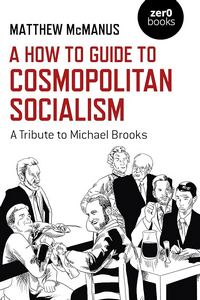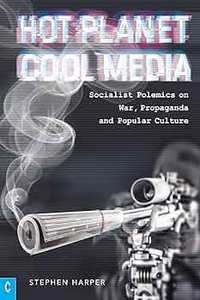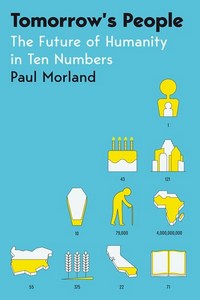Book reviews – McManus, Harper, Morland
Leftwing academic
 A How To Guide to Cosmopolitan Socialism. A Tribute to Michael Brooks. By Matthew McManus. Zero Books. 2023. 135pp.
A How To Guide to Cosmopolitan Socialism. A Tribute to Michael Brooks. By Matthew McManus. Zero Books. 2023. 135pp.
Michael Brooks was an American talk show personality, political commentator and comedian, who died in 2020 at the age of 36. Little known in the UK and Europe, Brooks identified himself as a socialist, a Marxist humanist and an anti-capitalist and was well known for mixing political analysis with comedy and, as George Carlin before him, putting across ‘controversial’ social ideas with brio and verve.
This volume by left-wing academic Matthew McManus presents itself as a tribute to Brooks and to the ideas he was known for in his writing and public and media appearances. However, most of it contains little reference to the man or his ideas but rather puts forward McManus’s own take on history and politics. What we have in the first half of the book is a brief, and not uncompelling, history of political thought from the earliest times to the present day, taking in the Greeks and Romans, St Augustine, the early ‘liberals’ (eg, Thomas Hobbes and John Locke), Kant’s ‘pure reason’ theories, 19th century socialist ‘internationalism’, and then different kinds of modern capitalist ideology. At the same time the author discusses the relationship of that theory to social developments and events including war, slavery, religion, class division, and much else. He then presents his own theories on recent developments in capitalism, especially in the US, dividing these up into neoliberalism (seen as beginning with the free-market ideas of such figures as Friedrich Hayek, Milton Friedman and Thomas Sowell), neoconservatism (described as ‘the ideological supplement to neoliberalism’), and then his own additional category, ‘post-modern conservatism’, ie, capitalism with an ultra-nationalist twist as under leaders like Trump and Bolsanaro.
Following this, in the final 35-page chapter of the book, entitled ‘What Would a Cosmopolitan Socialism Look Like?’, the author does place some focus on Brooks himself, in particular in a 7-page section sub-titled ‘Michael Brooks’ Cosmopolitan Socialism’. He explains that Brooks’ vision of socialism was of a world that would end ‘the division of society into contending social classes’ and in which ‘all beings should be entitled to the freedom and well-being necessary to lead a life of flourishing’. At the same time, the point is made that Brooks favoured what the author here calls ‘militant particularism’, meaning that ‘progressives’ should not hesitate to involve themselves in reformist activity, since, as he puts it, ‘it was Michael’s insistence that an injustice anywhere in the world was very much our business’. In this connection the author too advocates ‘socialist reforms’ such as ‘shortening the working week’ and calls for ‘limiting the influence of money’. Here of course we would part company both with Brooks and with the author of this book, on the grounds that involvement in reformism inevitably means putting the vision of a real socialist world, a democratic moneyless, wageless one of free access to all goods and services, on the back burner and eventually, as unfailingly happens with reformist groups and parties, losing sight of it altogether.
Here too this is precisely what seems to have happened with Brooks, for, despite the occasional references to the need for everyone to have a life of flourishing and to do away with contending social classes, there is no clear view of the democratic majority action that needs to be taken to establish such a society and indeed to the idea that it is even a feasible proposition. Instead we learn, for example, that Brooks was an admirer of Castro’s Cuba and, indeed that this tribute to Brooks ‘is intended as a quick primer on how the left can begin to think globally, even if we must continue to act locally’.
The other observation to be made about this book is that, while some of the time it uses clear, easily comprehensible language, too often it lapses into academic jargon which obscures rather than elucidates, seeming to go out of its way to make simple ideas over-complicated. To give just one example among many, to write that ‘neoconservatism is consonant with the paradigm of liberal imperialist adventurism, which includes a long genealogy of Conradian harlequins from Disraeli through Kipling and Bush’ is clearly no way to facilitate the understanding of readers. More generally, too, its theorising on the different incarnations or variations of capitalism (neoliberalism, neoconservatism, post-modern capitalism, etc) seems manifestly out of proportion to any practical differences these make to the lives of those who live under the capitalist system and to be irrelevant to the truly important question of how to replace the global system that capitalism is with a new global socialist system. Perhaps it is not surprising then that it fails to establish a clear meaning at all for ‘socialism’, with shifting notions ranging from ‘welfarism’ within capitalism, elements of social organisation within the Soviet Union, and Chile under Allende (one of various ‘socialist regimes’ mentioned).
So while there can be no argument with observations such as ‘the logic of the market precludes the socialization of resources’ and the book’s concluding call to ‘construct a shared world together as equals’, this is not matched by the author’s take on how that world is to be conceived and on the action necessary to bring it into being.
HKM
 Hot Planet, Cool Media. By Stephen Harper. Clairview, 2023
Hot Planet, Cool Media. By Stephen Harper. Clairview, 2023
As described by its subtitle, this is a compilation of socialist polemics on war, propaganda and popular culture, written between 2011 and 2022. In this near-decade, marked by populism, austerity and the smartphone, ‘the morbid symptoms of a decrepit social system and the corresponding expressions of public anger and despair became more acute’.
The book’s title, taken from one of its essays, refers to the gap between the state of the world and the media’s inapt and inept interpretations of it. A principle which underpins the book is that a constructive way to react to society’s grim events is to understand how and why information about them, in all its forms, is presented to us in the way it is. Many of the essays take war as an example: 2013’s Back To Iraq examines how the format of a BBC documentary about the war in Iraq enabled Western politicians to promote their account unchallenged, while ignoring economic considerations. Several insightful reviews of war films are included, such as Unbroken (2014), which displays a ‘national chauvinism’ that simplifies war into good versus bad. The formula common across most movies smooths out complications and reasserts traditional narratives, such as portraying the American army as always heroic.
Mainstream media, almost by definition, backs up the narrative most favourable to those with power and wealth: ‘Whether conservative or liberal, the loudest voices in the media are those of the ruling class’. As the essays explain, acceptance of our current social system lies beneath almost all political discourse, whether left or right wing. What are presented as alternatives to the status quo can still only act within the constraints of capitalism, such as when politicians and journalists ‘talk excitedly of ‘radical’ reforms’ or when the left lionises ‘social-democratic saviour-figures’ such as Barack Obama, Aung San Suu Kyi, Jeremy Corbyn and Jacinda Ardern.
The partiality and misinformation which permeate mainstream and social media impact on us and how we relate to the world. Some people react by turning to ‘conspiracy theories’ which, as the 2020 essay Making A Conspiracy Out Of A Crisis argues, to dismiss outright is as misguided as fanatically adhering to them. When people act by rioting, this is a reaction to ‘the deeply felt but unarticulated experiences of social alienation and inequality’, which the media glosses over with talk of ‘yobs’. Mental distress is a more widespread response to our circumstances, although its social origins are downplayed when it is regarded and treated as a biological illness, according to the 2013 essay Mental Illness And The Media.
The essays in Hot Planet, Cool Media usefully help us see and then see through the narratives dominant across the media. Once the biases of those on our screens are recognised, then the underlying social, economic and political causes of events and trends are revealed. Next is needed ‘collective and conscious political action to abolish the system’ that generates problems such as racism, war, alienation and climate change. This route to revolutionary consciousness is described with a welcome clarity and groundedness across the book’s 66 essays. Hot Planet, Cool Media is definitely recommended to anyone wanting to make sense of the previous decade and how it has shaped the world today.
As his focus is on other people’s interpretations, Stephen Harper doesn’t write much about his own experiences. A lively exception is the 2019 essay Election Reflection, about when he took part in hustings for the Socialist Party’s European Parliament Election campaign. He recounts (on p.160) that after one event ‘one of the independent candidates turned to me and made a cryptic but intriguing comment: ”you’re right … but you’re too early”. I was tempted to reply that with capitalism destroying the biosphere at an alarming rate, it’s not a moment too soon for socialism.’
MF
 Tomorrow’s People: the Future of Humanity in Ten Numbers. By Paul Morland. Picador £9.99.
Tomorrow’s People: the Future of Humanity in Ten Numbers. By Paul Morland. Picador £9.99.
In September we reviewed Hamish McRae’s The World in 2050, which, inter alia, makes some useful points about likely demographic changes, with ageing populations in many parts of the world but more youthful populations in Africa and India. Here Paul Morland discusses some similar issues, so we will focus on comments which differ from those made by McRae.
Improved education and literacy, particularly of women, have played a major role in reducing fertility rates. An extreme case is Singapore, where on average each woman has just one child. Many countries are becoming more like Denmark, with low fertility, very low infant mortality and long life expectancy. In the US there is a significant correlation between conservatism and high fertility, while in Israel the fertility rate is almost three children per woman. Deaths in childbirth in the US are over three times as high among black women as among white women.
Government policies can often restrict the number of children who are born, but it is much harder to achieve increased fertility rates. In China the one-child policy was relaxed in 2015 to a two-child policy, but the rate now is barely above 1.5 children per mother. It is likely that by 2050 one person in twelve in China will be over 80. The ageing population and correspondingly smaller workforce in Japan may well be behind the low rate of economic growth, and an ageing population in Russia may have contributed to its economic decline.
Migration is one way of maintaining population and reducing the impact of ageing. In Western Europe for instance, immigrants are often younger than ‘locals’, and their fertility rate comes to more or less match that of those already living in the country. Younger people are supposedly more rebellious than their elders and more likely to protest, as they are more impulsive and have fewer responsibilities.
One ongoing change relates to urbanisation, with the proportion of town dwellers in the world having passed one half a few a years ago, and likely to be around two-thirds by 2050. Urban food production can increase, with hydroponics enabling food to be grown indoors, ‘with a regulated environment and perfectly measured inputs, including LED light’. This would mean fewer herbicides and pesticides than conventional agriculture, and less need to transport food over long distances.
As an illustration of the pace of recent changes, Morland records what a taxi-driver in Indonesia said to him: ‘My dad and grandpa spent their lives crouching in the rice paddies. Driving a cab is much better than that, and now my son works in an air-conditioned office’. But what about his female relatives?
All in all, an informative and thought-provoking look at likely and possible futures, albeit without going beyond the current socio-economic system.
PB
One Reply to “Book reviews – McManus, Harper, Morland”
Leave a Reply
You must be logged in to post a comment.

Re: Hot World, Cool Planet
The ‘news’ really is just P.R. for the capitalist class.
This book (and the Socialist Standard) are antidotes to the capitalist media.